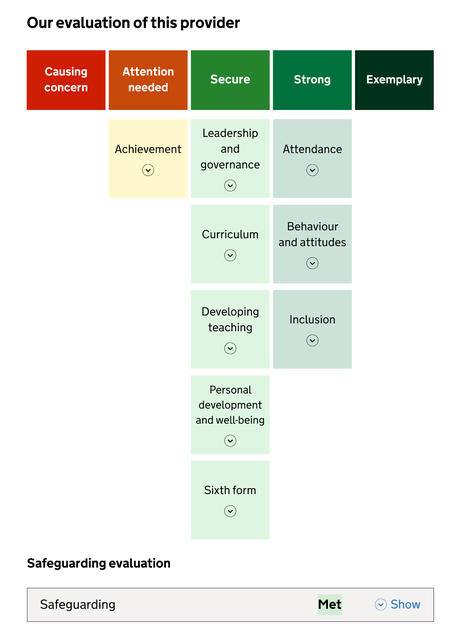Ofsted’s new proposals for inspecting education settings have been criticised by unions for being even worse than the system they would replace.
Previously, the inspectorate awarded one of four single-phrase inspection judgments: outstanding, good, requires improvement and inadequate.
But it is now proposing that schools in England could be graded across a variety of different areas using a colour-coded five-point scale.
A report card system would rate areas within the school – such as attendance, inclusion and achievement – from the red coloured “causing concern” to orange coloured “attention needed”, through the green shades of “secure”, “strong” and “exemplary”.
The reforms come after criticism of the inspection system following the death of headteacher Ruth Perry.
Mrs Perry took her own life after an Ofsted report downgraded her Caversham Primary School in Reading from the highest to the lowest overall effectiveness rating over safeguarding concerns.
Pepe Di’Iasio, general secretary of the Association of School and College Leaders, said: “Ofsted and the Government appear to have learned nothing from the death of headteacher Ruth Perry and have instead devised an accountability system which will subject a beleaguered profession to yet more misery.
“Rather than securing high and rising standards – something we all want to see – this is a sure-fire way of doing the exact opposite. People will vote with their feet by leaving teaching which will worsen an already severe recruitment and retention crisis.“We will end up without teachers to teach children and leaders to lead schools.
“Astonishingly, Ofsted’s proposed school report cards appear to be even worse than the single-word judgments they replace.”
He said the introduction of five new ratings that can be applied across various performance areas “creates a set of hurdles which will be bewildering for teachers and leaders”, and said it is “a recipe for systemic inconsistency”.
Mr Di’Iasio said: “We are extremely disappointed with these proposals and will do everything possible to persuade Ofsted and the Government to see sense.
“School and college leaders had high hopes that an approach to inspection based on report cards might be more nuanced and humane.
“Sadly, the way in which Ofsted and the Government are going about this suggests that the opposite will be the case.”
Paul Whiteman, general secretary of school leaders’ union NAHT, said the proposals “suggest an inspectorate determined to hold on to a model of inspection that is long past its sell-by date”.
He added: “The plan to retain numbered sub-judgements risks replicating the worst aspects of the current system and will do little to reduce the enormous pressure school leaders are under.
An example of how an Ofsted report card would look (Ofsted/PA)
“Given that Ofsted previously struggled to provide reliable judgments using a four-point scale, it is very hard to see how they will be able to do against a five-point one.
“As other inspectorates have shown, there is another way – a way to provide clearer information for parents and schools without resorting to grades.
“Avoiding the harm to education professionals caused by an outdated approach is not going soft on standards.
“The opposite is true, the current system is at the root of the teacher and leader retention crisis which in itself is a threat to the education we can deliver to children.”
He said the decision to remove “overarching judgments” was “absolutely the right one”, but said that must be a first step towards “fundamental reform of a broken system”.
Mr Whitman raised concerns about the design of the consultation.
“By using open-ended, free-text questions, Ofsted will be able to avoid gathering data accurately to gauge whether there is genuine support for the model it appears to have already chosen.
“Picking out what parents and professionals really think will be virtually impossible and the design risks losing sight of the wood for the trees.
“Ofsted is refusing to ask simple and straightforward questions about the extent to which stakeholders support these proposals.
“As a public body, Ofsted must do better than this – parents and professionals should be presented with a set of genuine options.
“Arbitrary deadlines must not be used to push reforms through if the support is not there,” he said.
Daniel Kebede, general secretary of the National Education Union, said the proposals “will make matters worse, not better”, adding: “It will not deliver better information for parents or school leaders.”
He said His Majesty’s Chief Inspector Sir Martyn Oliver has “failed to deliver” and “ignored the voice of the profession”.
Dame Rachel de Souza said she will ensure children’s voices are heard (Aaron Chown/PA)
“He has set a course for Ofsted to remain just as out of touch as before, just as crude in its assessments.
“We had high hopes that the removal of one-word judgements would signal a move towards a fairer, more supportive system that better captured the unique context of each school or college.
“Instead, the one to five grading scale proposed for the report card maintains the current blunt, reductive approach that cannot capture the complexity of school life nor provide more meaningful information to parents.
“We are concerned that inspectors categorising ten areas into five boxes in two days will exacerbate existing issues of inconsistency and unreliability.
“It is also plain to see that Ofsted’s plan does not address the mental health impact of the current ‘high stakes’ accountability systems on the profession,” he said.
Mr Kebede said Ofsted has failed to take seriously the “enormous concerns” of the profession.
“Ofsted is a discredited organisation with its name continually in the mud. It is incapable of introspection or change. This new consultation points only to continued disaster,” he said.
Chair of the Local Government Association’s Children and Young People Board, Arooj Shah, said: “The continued use of a single word judgement and how this can accurately reflect the complexities of the child protection system has previously raised concerns.
“We are pleased Ofsted has acted on our calls for a much greater focus on inclusion, and on whether a setting is playing a meaningful role in supporting vulnerable and disadvantaged children, including those with special educational needs and disabilities.
“We would also like to see this important work informed by the adoption of a nationally agreed definition of mainstream inclusion.”
Children’s Commissioner Dame Rachel de Souza said she welcomes the proposals to move towards a “more detailed and nuanced approach” to school inspections.
She added: “Replacing single-word judgments with broader evaluations of strengths and areas of improvement will give parents clear information about the quality of their child’s school.
“I am encouraged to see a stronger focus on inclusion and support for children with additional needs.
“I also welcome the decision to return to schools with identified weaknesses – it is essential that we improve standards in failing schools and give all children access to a high-quality education.
“I want to ensure children feel empowered by the new inspection system and I will make sure that their voices help shape the new report card.
“I look forward to engaging further in this consultation to ensure changes lead to a more transparent, balanced and supportive system that prioritises children’s education and wellbeing.”

